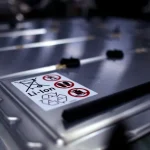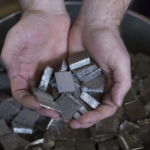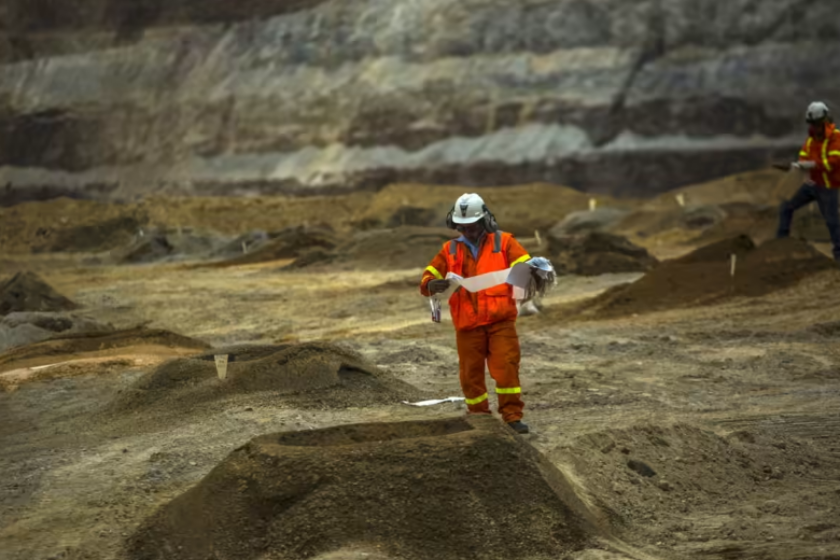A DW journalist has been given unprecedented access to rebel-controlled gold mines in the Democratic Republic of Congo. Miners and civilians are forced to risk their lives, while the wealthy buy gold in the global north.
We’ve been waiting for hours to meet rebel leader William Yakutumba. As darkness falls, a man who had introduced himself as Raymond, Yakutumba’s secretary general, assures our group of journalists that the rebel strongman is marching through the forest that surrounds Misisi town with his security escort.
He and some other rebels are drinking beers in a hideout, which from the outside looks like a hotel closed for construction. But from behind a barrier, it serves as a base for the Mai-Mai Yakutumba rebels who are from one of the most active groups in eastern Democratic Republic of Congo (DRC).
The Mai-Mai Yakutumba are feared for their brutality. They have repeatedly attacked an ethnic group called the Banyamulenge, a Tutsi group, that they say doesn’t belong to the DRC. They drive them out, indiscriminately raping and killing as they burn down entire villages.
‘Friends in high places’
The rebels can move freely without having to hide because they work together with the army, Raymond explains.
“A colonel of the Congolese army is my good friend,” he brags, calling what he says is the colonel’s number. He has a brief conversation on speakerphone — “proof” for the international journalists.
He shows us pictures on his cellphone: His rebel colleagues posing with AK47s and other heavy weapons as children stand among them. They all wear uniforms he claims they stole from defeated Congolese army soldiers.
“We have all kinds of uniforms. If I want to, I can become a police officer.” He joined the rebels after his whole family was killed when he was 9 years old, he says. They see themselves as a self-defense group against their enemies.
We wait in vain. Yakutumba never shows up. But we receive his permission to enter two mines that the group controls: Mitondo and Makungu, near Misisi town.
Who controls the mines?
According to a recent UN report, the group not only controls these two mines but also the routes to them and a vast area around them.
Our journey brings us to Nyange village, located beside the mines. But the village chief is not happy with our permits. Nor is he convinced by our letter stamped by the governor of South Kivu region. It seems the local chief doesn’t want us to go there.
Officially, the mine is controlled by the local authorities and the mining ministry, but after hours of discussions the village chief eventually admits to our local contact: He can’t let us go to the mines — it’s not safe because the rebels control it, not him.
After a long conversation, we admit to him that the rebels have given us their permission to visit.
He’s stunned. And lets us proceed. But only after we agree to be accompanied by a police officer, a soldier, an intelligence officer, the son of the chief, and a man who introduces himself as part of the local mining cooperative — but whom we later learn is actually one of the rebels.
Rebels in red
We notice all rebels we meet wear something red. Red trousers, red hats, a red ribbon somewhere. Red is their distinguishing feature so that villagers know who they are. They live among the villagers. Everyone knows they control the mine and tax the people working there.
According to the UN report, the Mai-Mai have been in control since December 2021, when they forced government troops out.
The Mai-Mai appointed a parallel administration to govern the mine, says the UN report, which miners confirm.
According to the report, up to 150 diggers are at the site, which produces between 1 and 2 grams of gold per week.
Miners extorted
At the Mitondo mine, our local contact manages to distract our entourage, allowing us to hide in one of the narrow tunnels and speak to one of the miners, who we call Michael. He tells us that he has to pay a “tax” of a few dollars each month to the rebels just to access the mine.
Together with different government taxes and the contribution for the mining cooperative, there’s not much of his salary left on which to survive.
“They take over what is most lucrative. They know exactly which mine is producing most gold, down to which tunnel,” Michael tells us.
In meter-wide tunnels that feel overwhelmingly hot, he scrapes out a gold-bearing rock. He tells us about their special breathing technique to help deal with the stifling heat. Flat, regular breaths to prevent fainting. “When you go to work, you just pray to God. Because we’re feeling like it’s a death sentence,” he says.
Often it is — when the mines cave in. Six years ago, more than 20 people were buried alive.
Another digger, Patrice, remembers it well. “I was there with my three brothers and other miners. All of them were trapped inside the mine. Up until now, their bodies are still inside. I was sad, really sad. But I can’t be sad for long. I have to earn a living.”
Other miners have similar stories. They say the Mai-Mai are never far away, even now that they’re hiding further up the mountain because they were told that we were coming.
Later, we confronted the Mai-Mai Yakutumba via WhatsApp about these allegations, but they never replied. Local government officials also repeatedly declined our interview requests. Several sources tell us that the rebels often work together with local authorities and even share profits with them.
Surviving a rebel attack
We later meet Esther Nanduhura, who is from the Banyamulenge ethnic group targeted by the rebels. She describes how she survived an attack by the Mai-Mai Yakutumba.
“They found us at the place we had sought refuge and they killed three people. Then they murdered my father-in-law and injured my mother-in-law,” she recalls.
Both of them were over 80, she says. She and her family were forced to march for days with no food. Then they took her husband. She never saw him again. Later she learned he had been hacked to death with a machete. They killed dozens, displaced hundreds in several attacks.
Now Esther is safe, sheltering with her eight children at a friend’s house in a bigger city.
She is aware that gold from DRC ends up in the rich part of the world; people there pay a lot of money for it.
“The Mai-Mai sell gold to white people to buy weapons — that’s why they sell the gold. I want to tell these white people to stop buying from them. So they stop killing us with these weapons.”
For Esther it is a simple equation: As long as armed groups can reap profits from gold mining, they will keep earning the cash to kill.
Fake gold certificates
The Democratic Republic of Congo has some of the purest gold in the world. Belgian businessman Yasin Karim Somji tells us that he is convinced of the purity of the gold in Misisi and other places in the North and South Kivu regions. He plans to soon open the first gold refinery in the DRC and export the gold to Europe, Asia and America.
“At the moment we are in long discussions with the government. They will check all artisan mine workers who will come here; they will try and trace it and maybe it will help. I hope it will help,” Somji says.
But it will be hard to make sure the gold that comes out of the region is not linked to rebels. Traders tell us that tracing certificates that indicate the origin of the gold are already altered in the first city they reach, Bukavu, in the DRC’s East.
From here it is often smuggled or officially exported — with fake certificates — across the border to Rwanda and other East African countries. Then it is transported to Dubai, a worldwide trading center for gold.
Eventually, it’s sold to the end consumer in Europe, the United States and other countries.
The vast majority of gold from DRC is smuggled illegally across the border. When it reaches its final destination it is virtually impossible to know where it originally came from.
Source: DW




